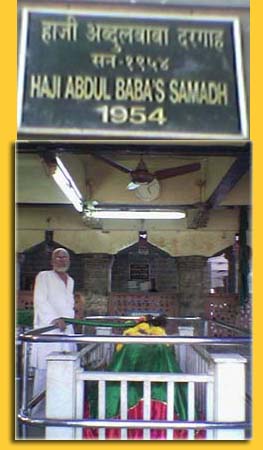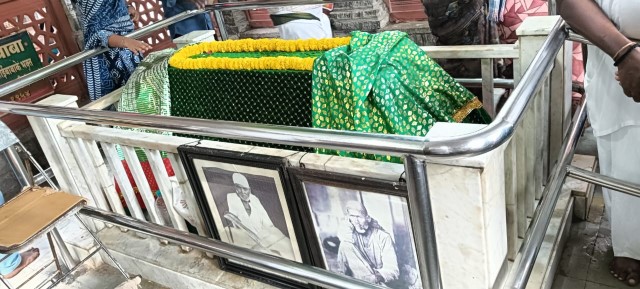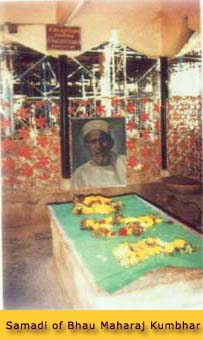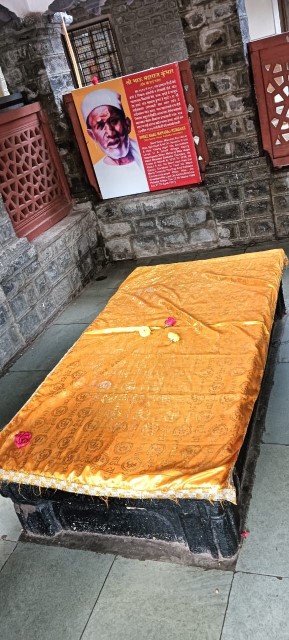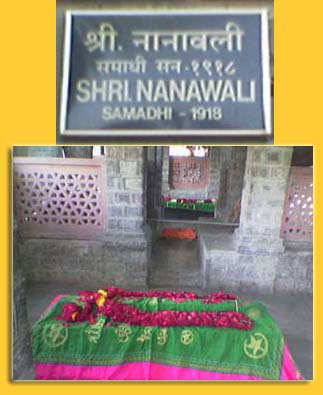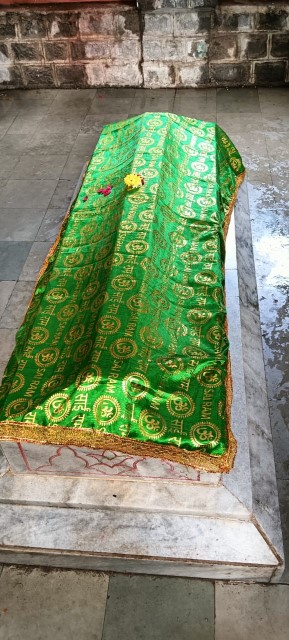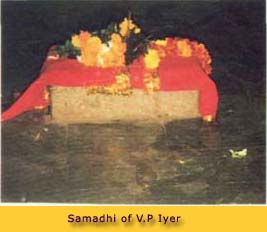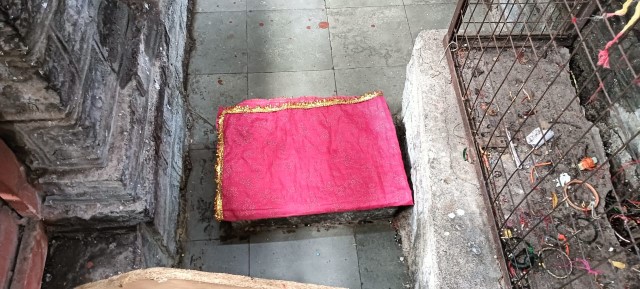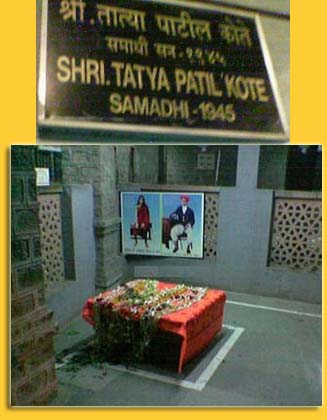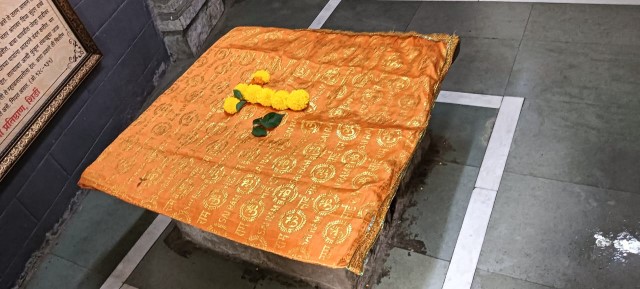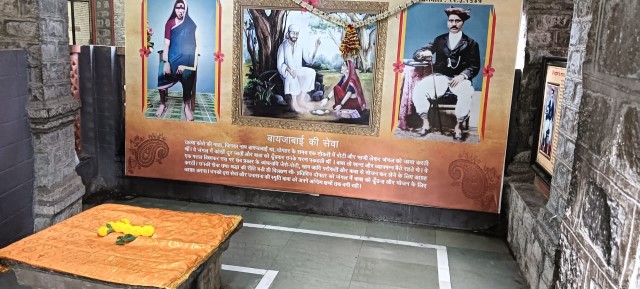SAMADHIS ON THE WAY TO LENDI BAGH
THE SAMADHI OF HAJI ABDUL BABA Abdul Baba was a resident of Nanded in Khandesh. He first came to Shirdi in 1889. He was under the care of fakir Amiruddin, who had a dream vision of Baba. In that vision Baba gave him two mangoes to give to Abdul and send him to Shirdi. The fakir did this and Abdul came to Shirdi. This is the first Samadhi to your right opposite to the Museum on the way to Lendi Bagh. Abdul Baba was the premier Sevak of Baba. He toiled from early morning keeping Shirdi clean, and taking care of Baba’s needs. Under Baba’s tutelage and care he progressed spiritually. Baba made him read the Quran daily and asked him to meditate on it. Abdul had the habit of writing down everything that Baba said, and read it daily as his Quran. After Baba's Mahasamadhi Abdul used this manuscript to make prophecy.
Samadhi of Abdul Baba He took Samadhi in April 1954. His Samadhi is looked after by his descendants. His descendant Ghani Bhai is given the honour of cleaning Baba’s Samadhi and doing Puja to it. This ritual is done daily at about 10 AM in Samadhi Mandir. SAMADHI OF BHAU MAHARAJ KUMBHAR This Samadhi is adjacent to Nanavalli's Samadhi. Sant Bhau Maharaj Kumbhar was highly spiritual and an ascetic from a very young age. His ancestors lived in a small village called Kairey Neemgaon of Sangamner District of Maharashtra and were Kumbhars (potters) by caste and profession and hence the surname. Bhau Maharaj came to Shirdi from that village as a young man and never went back. In Shirdi he stayed near the Shani Temple. At other times he stayed below the huge banyan tree, on the way to Rahata. Sometimes, he went to Rahata, Sakori, Neemgaon and other neighbouring villages but always returned to Shirdi. Kumbhar was the kindhearted Baba devotee, who loved children and trees alike. He was very unselfish, and would give away clothes and food that were given to him by the villagers. He took Bhiksha and survived on the food that he thus received. He was sensitive to other peoples’ needs. Sometimes he begged for alms or asked visiting devotees for money. But as soon as he received it he distributed it to the poor and homeless. On rare occasions he kept a small amount of it, and bought some sugar and gave it to the children; at other times he bought medicines that a child was prescribed, and gave it to the mother. The clothes or blankets that he received he gave it to the needy. He loved all living things, and was known to wrap a blanket around a tree, as he felt the tree also felt the bitter cold of Shirdi. Bhau Maharaj had cordial relationship with everyone. He spoke softly and respectfully. The villagers and visiting devotees liked and respected him. Sometimes mischievous people fought with him and stole the money or the clothes that he had received. This did not bother him and he showed no rancour towards the thieves. He did not hoard anything; his earthly possessions consisted of a staff, a khadi dhoti, a khadi turban and vest. On his shoulder he always carried a blanket made of sheep’s wool. Bhau Maharaj kept himself busy cleaning the streets of Shirdi. Between 8 a.m. and 2 p.m. he swept each and every street of Shirdi. This he did with his own blanket. Besides, he cleaned every gutter and every outdoor sink where the housewives wash their utensils and clothes. He swept the streets again before dusk, and pulled out any floating debris from the gutters. Whether it rained or was scorching hot he did not deviate from his daily routine. At about 5 a.m., he went and had Baba’s darshan. This he did rather secretively. In fact, he went many times in the day and Baba communicated with him verbally or silently. The other devotees did not know when he went for darshan. Nor could they decipher the spiritual guidance given by Baba. Baba treasured the spiritual sessions that he had with Baba and did not divulge their contents to anyone. Once Butti asked him about it. Bhau Maharaj smiled and replied “My father gives me 1/4th of his Bhakari and tells me sweet stories”. After Baba took Mahasamadhi, Bhau Maharaj took darshan of his Samadhi several times in the day. This he did secretly and no one could figure out when he went for Darshan. The attachment between Baba and Bhau Maharaj was very deep and strong. About a week before he took Samadhi, Bhau Maharaj was sick. He had loss of appetite and did not eat anything. He drank a great deal of water. The symptoms indicated that he had severe diabetes. Raghuvir Bhaskar Purandare and Sagunmeru Naik looked after him and took great care of him. He breathed his last on Chaitra Krishna Paksha Tritiya the 12th Shake 1860 (i.e., 27th April 1937). The news of his demise spread like wildfire. The devotees gathered together and built his Samadhi under the neem tree on the way to Lendi Baugh.
Samadhi of Bhau Maharaj Kumbhar On 7th May 1937 i.e, 12th Day of his demise there was a grand Bhandara (feast) in the honour of the gentle saint. The next day (i.e., 13th day) there was another feast of Shira (a type of halva made with jaggery) and a multitude of devotees were fed to their hearts’ content. On this auspicious day a beautiful portrait of Sant Bhau Maharaj Kumbhar was given a place of honour in the Samadhi Mandir photograph gallery. Every year in Chaitra Masa, the Shirdi Saibaba Sansthan performs his Punyatithi and a grand Bhandara is organized, and any and everyone can partake in it. Even today many mothers, bring their infants and lay them on his Samadhi, and take a little dust from it, and apply it to the forehead of the child with a prayer that the child may grow up to become just like him. THE SAMADHI OF NANAVALLI Nanavalli (Shankar Narayan Vaidya), an ardent devotee of Baba was misunderstood by many persons in Shirdi. There were two factions. One faction respected him while the other faction thought that he was a troublemaker. Nanavalli was an Avadhoota and would do strange acts that annoyed the devotees. He would keep scorpions in his mouth or drink water from the gutter. Sometimes he would slap a devotee on his cheek and at other times he would pick fights with the visiting devotees. Baba would gently rebuke him saying “If you behave like this, devotees will stop coming to Shirdi”. Sometimes he would smear his body with dirt; this amused the children of Shirdi. Then he along with a group of children would go to the Dwarakamai and create a raucous scene. Nanavalli addressed Baba as Kaka (Paternal Uncle) as Baba loved him a lot. When Nanavalli first came to Shirdi, Baba said “Nanavalli I have put on the lock, and the key is with you. Do not betray me and I will not betray you”. These words of Baba convey the deep bondage that existed between the two. He took a keen interest in keeping order in the Dwarakamai and would see to it that every devotee got darshan. He was a well built man. He could walk extremely fast or run when chose to. His love and devotion towards Baba was no less than Hanuman’s love and devotion towards Rama. Once Nanavalli came to Baba, and holding his hand made him get up from his Gaddi. Baba got up and Nanavalli sat there for a little while, then with a great deal of respect he made Baba sit on it again. Then he prostrated before him, and said “Oh Lord only you can occupy this seat, as it befits your divinity. My place is at your feet”. This Leela has been described in detail in Shri Sai Satcharitra Chapter 10.
Samadhi of Nanavalli Nanavalli was devastated with grief by Baba’s Mahasamadhi. He felt it was futile to live any longer, as life without Baba was worthless. On the 13th day of Baba’s Mahasamadhi, i i.e., on 27th October 1918 he cried “Kaka, Kaka” and left his mortal body. His Samadhi is built over his body; and is next to Abdul Baba’s Samadhi on the way to Lendi Baugh.
THE SAMADHI OF V.P. IYER Just behind Nanavalli's Samadhi is this Samadhi. He lived with his wife and six children in Lucknow. Iyer was kind hearted, affectionate and devoted to Baba. He loved Baba immensely. Once he heard someone talk ill of Baba and cried inconsolably. He was a Sugar Technologist by profession. During those days, the job was on a contract basis. Hence he had to go and work at various sugar mills till the season was over. In 1943 he went through a rough period as he did not have any job contract. This did not bother him and he told his family not to worry as Baba knew what was good for him. In 1944, he got a job in the Lakshmi Wadi Sugar Mills near Kopergaon. Iyer was extremely happy and he told his family and friends that Baba called him close to Shirdi. Being an ardent devotee of Baba, he visited Shirdi frequently. The contract with the Sugar Mill was up to 7th of May, but he had decided to spend the rest of his life in Shirdi.
Samadhi of V.P.Iyer On 27th May, on one of his visit to Shirdi he fell ill and was diagnosed with Cholera. The Doctors were called to treat him. Soon his condition worsened, and he became semiconscious. He lay with his eyes closed and would open them at times only to look at Baba's Photo. Then embracing Baba's photograph he said "Baba, Saibaba” and smilingly breathed his last. The villagers loved him immensely and they requested the Sansthan to build his Samadhi in Shirdi. THE SAMADHI OF TATYA KOTE PATIL This is the last Samadhi and is next to the compound wall of Lendi Baugh. Tatya, the beloved son of Baijama, died on 12th March 1945. He was enveloped by Baba’s grace right from birth. He and Baba had a very loving relationship. Although outwardly they had a playful relationship, Tatya let his home to sleep in Dwarakamai with Baba for fourteen years. Baba on the other hand is said to have “given up his life for Tatya” on the day of Vijayadashami in the year 1918. Tatya recovered from his illness and led a peaceful and fruitful life till his Samadhi.
Samadhi of Tatya Kote Patil
Samadhi of Tatya Kote Patil Tatya had three wives; the first wife did not have any children. The second had a daughter, and the third had a daughter and three sons. Baba had promised Baijama to look after Tatya’s welfare, and to give him Santhathi (Children).
Unfortunately, his date of birth and other details of his life are not known. His descendants are leading a fruitful life at Shirdi. |
(Source: Ambrosia in Shirdi and Baba’s Gurukul by Vinny Chitluri. Photo Courtesy: Shri.Pranav, Sagar Colony, Nirmal District, Telangana) |
|---|
